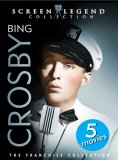| Reviews & Columns |
|
Reviews DVD TV on DVD Blu-ray 4K UHD International DVDs In Theaters Reviews by Studio Video Games Features Collector Series DVDs Easter Egg Database Interviews DVD Talk Radio Feature Articles Columns Anime Talk DVD Savant Horror DVDs The M.O.D. Squad Art House HD Talk Silent DVD
|
DVD Talk Forum |
|
|
| Resources |
|
DVD Price Search Customer Service #'s RCE Info Links |
|
Columns
|
|
|
Bing Crosby: Screen Legend Collection
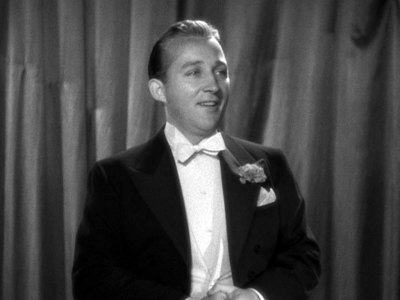
BING CROSBY: SCREEN LEGEND COLLECTION
I'm not sure where, exactly, Bing Crosby resides now in the current popular culture. Of course, almost anyone can name his massive Christmas hit, White Christmas, which used to be the biggest selling single of all time (and which undoubtably will be again at some point -- I doubt they'll be selling Elton John's odious tribute to Princess Di a hundred years from now). Anyone growing up even as late as the 1970s knew him from the famous Road pictures with Bob Hope and Dorothy Lamour (they were on pre-cable TV all the time back then), as well as his yearly Christmas specials on TV. And certainly previous generations knew his reassuring, mellow voice from decades of superstar, crooning recordings, as well as from an acting career in movies that was equally celebrated (including an Oscar for the 1944 Christmas perennial, Going My Way). It's been almost thirty years since Bing Crosby died, so other than the yearly Christmas showings of Going My Way, Holiday Inn and its color remake, White Christmas, as well as the seemingly inescapable (and thankfully so) White Christmas, it's difficult to pin down exactly how he registers with people today. Universal's Franchise Collection, noted with DVD buyers for cheaply gathering older or odd titles together with a unifying theme (such as the new Rock Hudson Franchise Collection), presents the Bing Crosby: Screen Legend Collection. Gathered here are five Crosby titles, three from Paramount (which have reverted to Universal's control) and two from Universal, from the years 1937 to 1944. The Bing Crosby: Screen Legend Collection is a terrific way to get reacquainted with Bing, presenting five bouncy, breezy titles that satisfied his Depression and WWII-weary audiences.
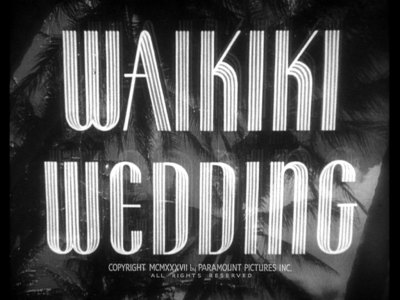
WAIKIKI WEDDING
1937 / 89 minutes / black & white / full-screen
Starring: Bing Crosby, Bob Burns, Martha Raye, Shirley Ross, George Barber, Leif Erickson, Grady Sutton, Granville Bates, Anthony Quinn
Screenwriters: Frank Butler, Don Hartman, Francis Martin, Walter DeLeon
Cinematographer: Karl Struss Editor: Paul Weatherwax Music: Ralph Rainger Producer: Arthur Hornblower, Jr.
Director: Frank Tuttle
Tony Marvin (Bing Crosby) is an ad man for the Imperial Pineapple Factory of Hawaii. Evidently, the majority of Tony's duties require him to hang out on his boat with his friend, Shad Buggle (Bob Burns). Tony's latest idea for J.P. Todhunter (George Barber), the owner of the factory, was to bring a contest winner over the Islands, crown her the Pineapple Girl, and have her write newspaper dispatches from her experinces, no doubt praising the beauty of the Hawaiian islands - along with the benefits of the Imperial Pineapple Factory. However, word comes to Tony from his boss that Georgia Smith (Shirley Ross), the Pineapple Girl, isn't at all happy with her travels. Evidently, she intends on writing that the Hawaiian Islands are nothing like the romance-soaked pleasure domes she had envisioned. Tony decides to make her dreams come true by romancing Georgia, with Tony even going so far as to arrange a fake hijacking of the couple - accompanied by Shag and Georgia's loud-mouth friend, Myrtle (Martha Raye) - to a smaller island, where Tony stages a fake volcano eruption, as well. Naturally, Georgia finds out Tony's game (including the fact that he's already written some of her dispatches, without her consent), and romantic complications ensue. Will the two lovers get back together?
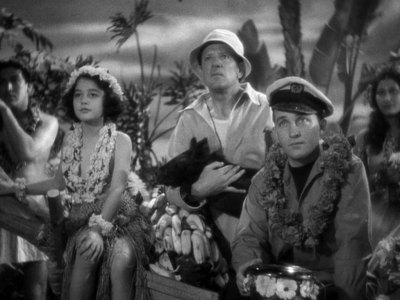
Waikiki Wedding was the third highest grossing picture of 1937, and launched the monster hit song, Sweet Leilani, further fueling the craze for anything Polynesian here on the mainland. It's not hard to see why audiences flocked to this film. Certainly nothing to tax the brain, Waikiki Wedding is an entertaining piece of fluff, expertly crafted to lift the spirits of Depression-era America. Imagine the impact of seeing something like this in a dank, dark movie house in some gritty urban city? Waikiki Wedding celebrates an imaginary paradise of relaxation, of easy living among the palms, with carefree, barely dressed natives who laugh and dance to the driving rhythm of the drums, while the sweet scent of tropical flowers floats along under the moonlight. There's no Depression here on the Islands; Bing makes a very good living just coming up with promotional ideas; there's no ditch digging or bread lines in his future. He's a big operator on the island, too, wielding enough respect from the natives to have them fake no less than a volcanic eruption to impress his beautiful cohort.
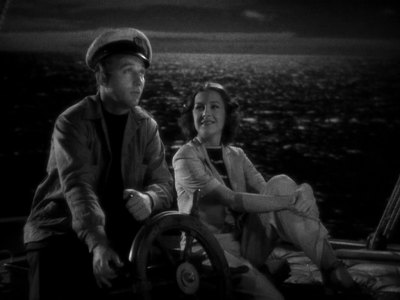
Waikiki Wedding is also admirable in its depiction of the Hawaiian natives. Subtitles aren't used, letting the audience hear the authentic language of the people. As well, they're not treated in a patronizing way here (as so often was the case in these types of films); they're viewed as people to be admired and envied, happy in a culture that Bing obviously respects. The opening tracking shot, depicting a glorious Hawaiian wedding, is beautifully shot by director Frank Tuttle in that gauzy, languid manner associated with the Paramount style. It's a marvelous way to start the film, and sets the tone for the rest of the movie. Bing is certainly relaxed here, singing his songs with aplomb, while maintaining a good rapport with his co-star Ross; his lovely duet with Ross, singing Blue Hawaii while we see authentic location shots of boats off the Hawaiian coast, is a highlight of the film. If the comedy of Martha Raye now seems grotesquely over-the-top, we have to remember that, for the time, she was considered a real innovator for female comedians, with a style that no one had seen before. The actual mechanics of the plot begin to bog the film down in the third act, but that doesn't spoil the fun of the film's beginning, leaving the viewer with a satisfying escapist experience.
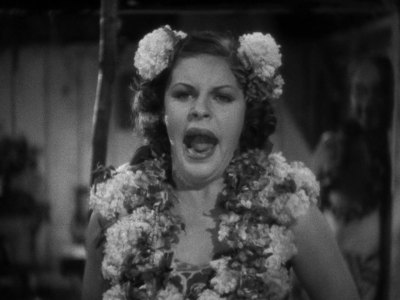
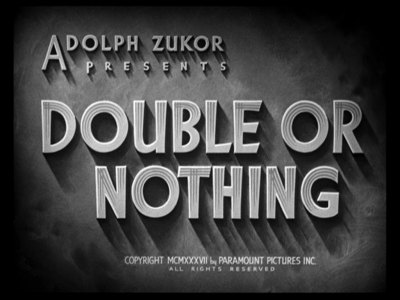
DOUBLE OR NOTHING
1937 / 91 minutes / black & white / full-screen
Starring: Bing Crosby, Martha Raye, Andy Devine, Mary Carlisle, William Frawley, Samuel S. Hinds, William Henry, Fay Holden
Screenwriters: John C. Moffitt, Erwin Gelsey, Duke Atteberry, Charles Lederer
Cinematographer: Karl Struss Producer: Benjamin Glazer
Director: Theodore Reed
According to the late Axel Clark, a millionaire philanthropist, all people are essentially honest and good. To prove his point, his lawyers have been instructed to drop wallets all round town that have a $100 dollars in them -- as well as the address for the lawyers' office. Clark's idea was to have the people who were honest enough to return the money, be given $5,000 dollars. The first person who managed to double that sum within one month, through honest means, could lay claim to Clark's entire estate. Otherwise, the entire estate would go to Clark's mean, crooked brother, Jonathan (Samuel S. Hinds).
Of course, "Lefty" Boylan (Bing Crosby) was honest enough to return the found dough, and along with the three other honest citizens -- Liza Lou Lane (Martha Raye); Half-Pint (Andy Devine); and John Pederson (William Frawley) - the four decide to pool their efforts to succeed, agreeing to split the money four ways when one of them eventually succeeds. Complicating matters is the absolutely unscrupulous means by which Jonathan Clark and his family try to undermine their efforts, going so far as to have his daughter, Vicki (Mary Carlisle) romance Bing in an effort to sabotage his plans for a nightclub. Will our plucky common folk persevere, and inherit Old Man Clark's fortune? Will Lefty and Vicki finally, truly get together?
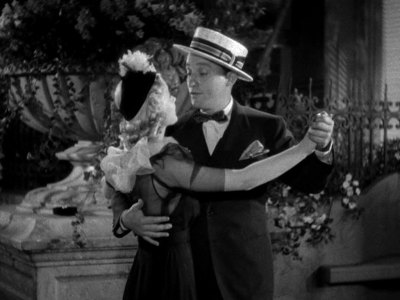
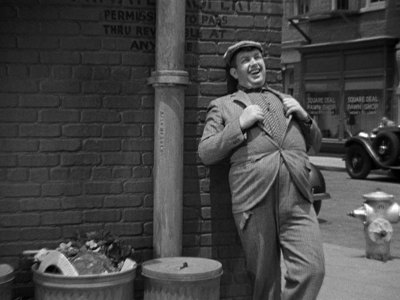
Bing gets to sing some smart tunes (The Moon Got In My Eyes and Smarty being standouts), while romancing cool beauty Carlisle. Andy Devine, always a pleasure, is a fun Crosby sidekick, and Martha Raye eases off a bit from her prior over emphatic performance in Waikiki Wedding. Playing a stripper who can't help but strip when she hears her signature song, Raye's comedy is still a little hard to take from a modern sensibility, but there's no denying her musical performing talent. She has a standout number, It's On; It's Off, which she performs on an amazing studio lake set (did anyone else notice the weird continuity gaffe where she starts out - alarmingly - without a skirt on under that too-short coat, only to have it appear at the end of her number?). Some of the speciality numbers brought in at the end of the film, particularly Ames and Arno's knockabout tango number, and The Galgary Brothers slow motion fight, are quite amazing looks at the now all-but-forgotten wealth of talent that used to abound in the post-vaudeville days of Hollywood. Directed in a straightforward, unobtrusive style by Theodore Reed, Double or Nothing delivers the goods for Crosby fans.
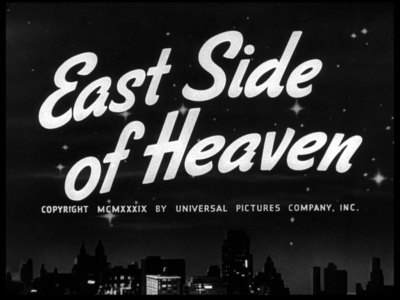
EAST SIDE OF HEAVEN
1939 / 88 minutes / black & white / full-screen
Starring: Bing Crosby, Joan Blondell, Mischa Auer, Irene Hervey, C. Aubrey Smith, Robert Kent, Jerome Cowan, Baby Sandy
Screenwriters: William M. Conselman
Cinematographer: George Robinson Producer: Herbert Polesie
Director: David Butler
Denny Martin (Bing Crosby), a New York singing telegram artist, has been engaged to sing Happy Birthday as a joke (unbeknownst to Denny) for crusty, controlling millionaire, Cyrus Barrett, Sr. (C. Aubrey Smith), by his drunken son, Cyrus, Jr. (Robert Kent). Junior, who's unhappy in his marriage because of his meddling father's influence, hires Denny because he knows his father detests singers. On his way over to Barrett's townhouse, Denny stops down at the lobby to say, "Hi," to his bride-to-be (for the fourth attempt), Mary Wilson (Joan Blondell), and to confirm that yes, indeed, they will finally be married the next day. Arriving at Barrett's, Denny overhears Mona Barrett, the wife of Cyrus, Jr. (and an old friend of Denny's) being threatened by Cyrus, Sr., who wishes to keep the couple's young child at his home. She, on the other hand, wishes to leave with her child. Denny sticks up for her, and is promptly fired the next day. Unable now to get married, Denny finds himself in deep hot water, along with his eccentric Russian roommate, Nicky (Mischa Auer), when Mona brings her baby to stay with Denny while she tracks down her husband to patch her marriage back together.
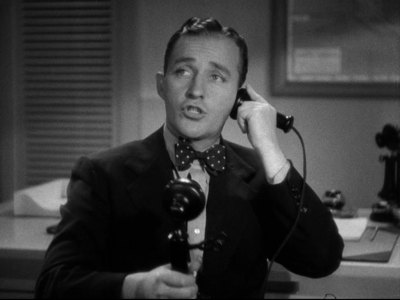
Complicating matters further, snide radio gossip columnist Claudius De Wolfe (Jerome Cowan), who has designs on Mary, finds out that Denny, who has now become the Cruising Troubadour (a singing taxi driver), is involved with the lost grandson of super-rich Barrett, Sr., and manages to spirit the baby away. Will Mona and Cyrus, Jr. patch up their marriage? Will Denny return the baby to the controlling grandfather, or the loving mother? Will Denny and Mary finally marry?
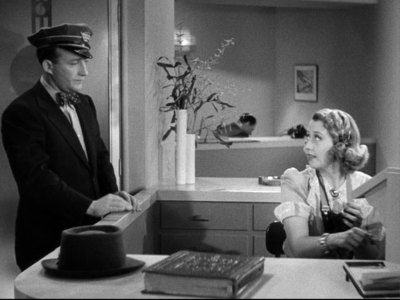
East Side of Heaven is a protracted situation comedy, with the oft-filmed dilemma of a bachelor caring for a baby. While the film certainly has charm to spare, particularly in the appealing scenes between Baby Sandy and Bing (his song to her, That Sly Old Gentleman, as they sit on the window sill, looking out at the lights of New York, is very effective), much of East Side of Heaven seems slow going, despite the peripatetic presence of Auer as Bing's buddy, and the usually snappy Blondell. Blondell's almost worthless part is the real crime here, her trademark gum-snapping vitality sadly missing from a character that's not really asked to do anything but react to Bing's situation. The complications of the plot don't build the sense of comedic chaos and the laughter in the viewer as they should, instead merely serving to bog down the viewer in too many exposition scenes. Cute in spots, East Side of Heaven shows the effortless charisma of Bing the singer, but taxes him in no way as an actor.
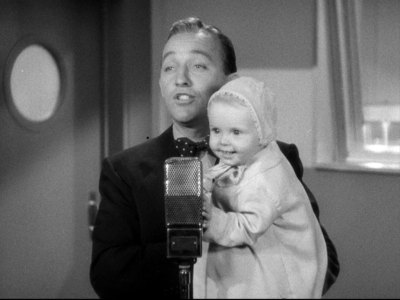
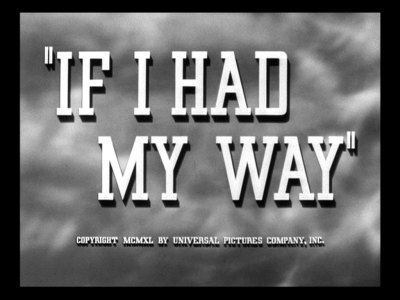
IF I HAD MY WAY
1940 / 94 minutes / black & white / full-screen
Starring: Bing Crosby, Gloria Jean, Charles Winninger, El Brendel, Allyn Joslyn, Claire Dodd, Donald Woods, Nana Bryant, Moroni Olsen
Screenwriters: William M. Conselman, James V. Kern
Cinematographer: George Robinson Producer: David Butler
Director: David Butler
Bridge workers Buzz Blackwell (Bing Crosby), Fred Johnson (Donald Woods), Axel Svenson (El Brendel) enjoy their business and each other's company, as they help raise Fred's daughter, Patricia (Gloria Jean). However, a terrible accident takes the life of Fred, necessitating Patricia's return to relatives in New York whom she has never met. Buzz and Axel depart with Patricia, and track down her uncle, Jarvis Johnson (Allyn Joslyn), a snobby rich fusspot, and his supercilious wife, Brenda (Clair Dodd). However, Jarvis, having received Buzz's telegram warning of their arrival, has already decided that he wants no part of Patricia, and pretends to be someone else when the trio show up at his palatial East 56th Street penthouse. On their way to the other "J. Johnson" on West 56th Street, they meet Patricia's great uncle, Joe Johnson (Charles Winninger), and his wife, Marian (Nana Bryant). The poor, but kindly ex-vaudevillians welcome Patricia with open arms - and empty pockets. Fully intending to give Joe the money that Patricia's father left her, he finds that Axel, on a drunk, has taken the money and bought a failing Swedish restaurant. With little choice now but to make a go of the business, Buzz decides to turn the restaurant into a nightclub, utilizing the ex-vaudevillians friends of Joe and Marian. Will Jarvis thwart their plans when he finds out he was tricked by Buzz into lending him money? Will Patricia find a happy home where both sides of a warring family finally get together? Will Axel knock off that hackneyed Swedish ethnic humor?
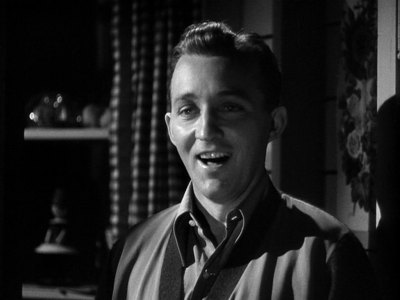
Playing strictly like a "B," If I Had My Way doesn't exactly offer any new situations for the viewer, with the only real twist being that no romantic interest springs up for Bing. Here, he's operating strictly solo, playing surrogate big brother to the teen coloratura soprano, Gloria Jean. While the acting is generally fine, the stock situations work against any kind of viewer excitement. If I Had My Way is a pleasing enough diversion, but it's really not worthy of Bing's talents. As for El Brendel as Axel, frankly, any kind of lame Swedish ethnic comedy in films (and there's a surprising amount of it in Hollywood history, for some unknown reason), makes me queasy. When I start hearing all those, "Ja's!" and "comedic" broken sentences, I cringe inside. If that's your cup of tea, more power to you; you'll love the whole subplot with Axel and the Swedish restaurant. But if you're like me, you'll pass up that particular smorgasbord. Gloria Jean is cute, as usual, and her voice is amazing. She has a lovely moment with Bing, where he sings the haunting title song, with the New York skyline as a backdrop, but those kinds of moments are few and far between. Instead, we have to settle for low-comedy scenes with Patricia's pet squirrel, and Axel's constant mugging. Despite Bing's presence, If I Had My Way is strictly second-run material.
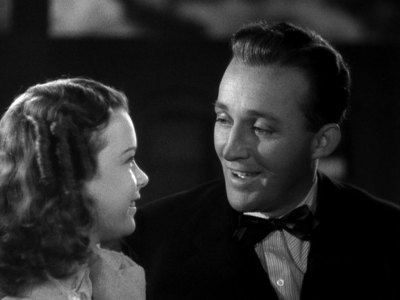
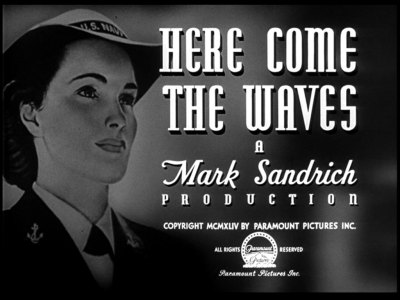
HERE COME THE WAVES
1944 / 100 minutes / black & white / full-screen
Starring: Bing Crosby, Betty Hutton, Sonny Tufts
Screenwriters: Allan Scott, Zion Myers, Ken England
Cinematographer: Charles Lang Producer: Mark Sandrich
Director: Mark Sandrich
Johnny Cabot is the hottest singer with the bobbysoxer set. And his biggest fan is Susan Allison (Betty Hutton). This crazy blonde bombshell is one-half of a singing twins act, her serious sister Rosemary (Hutton, again, in a dual role) providing the necessary grounding for kooky Susan. Unbeknownst to Susan, Rosemary signs up to join the WAVES (this being WWII), which Susan is against -- until she learns that Johnny is going to be drafted by the Navy, too. Following Johnny out in California, Susan manages to arrange a double date with Johnny and his sailor pal, Windy (Sonny Tufts). Unfortunately for Susan, Johnny only has eyes for the more serious sister Rosemary - as does Windy. What follows are a series of romantic comedy misunderstanding and entanglements (with all the stock confusions utilized in any twin comedy), including Susan getting Johnny pulled off his battle-ready ship to produce and star in a stage show for recruitment purposes. Will Johnny wind up with Susan or Rose? Will Windy knock Johnny's block off? Will the WAVES recruitment drive be successful?
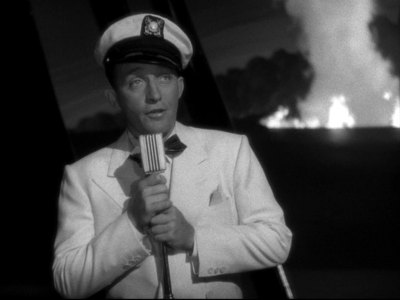
Along with Waikiki Wedding, Here Come the Waves is the best offering in the Bing Crosby: Screen Legend Collection. Fast-paced, funny, with great songs and production numbers, along with firecracker Betty Hutton and easy-going, self-parodying Bing, Here Come the Waves is exactly the kind of war-time propaganda that went down easy with a war weary audience. Betty Hutton especially deserves praise for pulling off the neat trick of creating two separate characters, and making them believable. It doesn't hurt that the special effects are remarkably good here; with the use of almost invisible split-screens and doubles, it's almost impossible to see the cracks in the special effects, and this aids immeasurably in Hutton's performances. Especially delightful as wild Susan, Hutton, with her sexy blonde mane of hair and goofy, pretty face, immediately jacks up the energy level of Here Come the Waves, providing a welcome lift in comparison to Bing's usually sedate female co-stars.
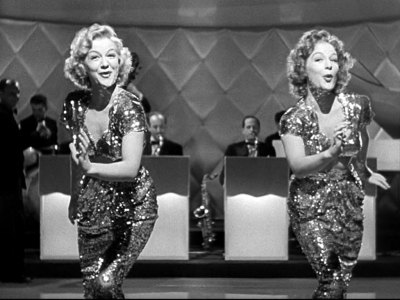
Sonny Tufts, now largely forgotten, found himself in vogue during the war years (when all the other major male stars were off fighting the war), before eventually becaming a joke with later critics who questioned his acting abilities (and his distasteful off-screen antics). I'm not an afficionado of his career; I've only seen a handful of his films, but he's fine here as Bing's big, brawling, slightly dopey sailor friend. He's obviously not a well trained actor, but there's an awkwardness to his approach that's oddly enduring, and in this part, that quality works well for him. Billed as his first singing role, he does well enough at that, too, in a blackface duet of Accentuate the Positive with Bing. It's an exceedingly uncomfortable moment in the film for modern viewers; certainly the notion of minstrelsy in films is a complicated matter, but if one thing can be stated firmly, it is that such moments must not be censored from these older titles. It's important that their legacy, however flawed, be included in our historical record.
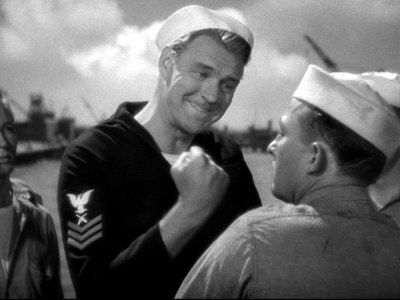
Here Come the Waves has a good sense of humor about itself, including it's veiled parody of the sensation Crosby caused during his own bobbysoxer days. He's quite good now in front of the camera, with a confidence no doubt strengthened by years of knocking out hit after hit. True, the film often turns to overt recruitment propaganda, including showing real documentary footage of the WAVES in action, with the film working hard to convince women on the home front to join up, and help support the war effort. But that doesn't get in the way of the film's entertainment value, courtesy of Bing and Betty. Here Come the Waves is a sprightly war-time musical comedy that holds up very well today.
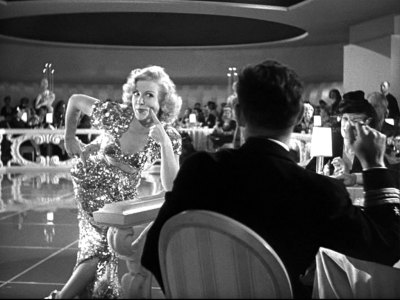
The DVD:
The Video:
The prints used for the five titles in the Bing Crosby: Screen Legend Collection look pretty good, considering the age of the original films. No restoration has occurred, though, with scratches and dirt specks still visible. But the transfers do look better than previous video releases. They are all full frame, in their original, correct 1.33:1 screen ratios.
The Audio:
The audio tracks for all five films are a serviceable Dolby Digital 2.0 Mono. The tracks do accurately reflect the original sound of these films when first premiered at the theatres. There are English and French subtitles available.
The Extras:
As with most Universal Franchise Collections, the only extras a consumer might hope to expect are the titles' trailers. For the Bing Crosby: Screen Legend Collection, there is only one trailer included, for Here Come the Waves. One. Frankly, even for the budget line Franchise Collection, that's pathetic.
Final Thoughts:
Bing Crosby: Screen Legend Collection is a good bet for any Crosby fans still out there. Maybe I'm being too pessimistic, there. Maybe there's still a sizeable group of Crosby fans who are waiting for this collection to come out. I hope so; Bing Crosby was one of the most influential - and underrated - singers of the first half of the 20th century, and one of the screen's most accomplished, intuitive actors. The Bing Crosby: Screen Legend Collection is a nice addition to the Crosby DVD library. Recommended.
Paul Mavis is an internationally published film and television historian, a member of the Online Film Critics Society, and the author of The Espionage Filmography.


|
| Popular Reviews |
| Sponsored Links |
|
|
| Sponsored Links |
|
|
| Release List | Reviews | Shop | Newsletter | Forum | DVD Giveaways | Blu-Ray | Advertise |
|
Copyright 2024 DVDTalk.com All Rights Reserved. Legal Info, Privacy Policy, Terms of Use,
Manage Preferences,
Your Privacy Choices | |||||||









